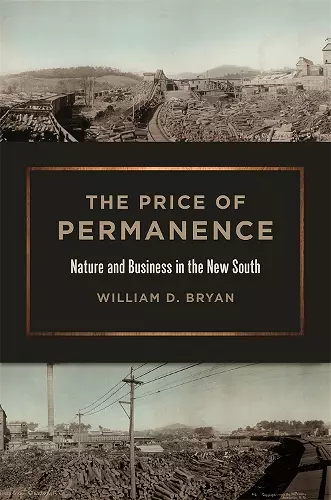The Price of Permanence
Nature and Business in the New South
Format:Paperback
Publisher:University of Georgia Press
Published:15th Nov '20
Currently unavailable, our supplier has not provided us a restock date

A reframing of environmental thoughts and incentives in the New South
Using the lens of environmental history, William D. Bryan provides a sweeping reinterpretation of the post–Civil War South by framing the New South as a struggle over environmental stewardship. Ultimately, he uses lessons from the New South to reflect on the path of American conservation and notions of sustainability today.
Using the lens of environmental history, William D. Bryan provides a sweeping reinterpretation of the post–Civil War South by framing the New South as a struggle over environmental stewardship. For more than six decades, scholars have caricatured southerners as so desperate for economic growth that they rapaciously consumed the region’s abundant natural resources. Yet business leaders and public officials did not see profit and environmental quality as mutually exclusive goals, and they promoted methods of conserving resources that they thought would ensure long-term economic growth. Southerners called this idea "permanence." But permanence was a contested concept, and these businesspeople clashed with other stakeholders as they struggled to find new ways of using valuable resources. The Price of Permanence shows how these struggles indelibly shaped the modern South.
Bryan writes the region into the national conservation movement for the first time and shows that business leaders played a key role shaping the ideals of American conservationists. This book also dismantles one of the most persistent caricatures of southerners: that they had little interest in environmental quality. Conservation provided white elites with a tool for social control, and this is the first work to show how struggles over resource policy fueled Jim Crow. The ideology of "permanence" protected some resources but did not prevent degradation of the environment overall, and The Price of Permanence ultimately uses lessons from the New South to reflect on sustainability today.
Ultimately, Ryan’s book is a significant addition to and revision of both conservation and New South historigraphies by intertwining those two seemingly disparate threads of historical knowledge and challenging narratives that southern economic growth in the late nineteenth century and early twentieth centuries was unconcerned with environmental impact.
-- Trevor T. Egerton * North Carolina Historical ReviISBN: 9780820358789
Dimensions: unknown
Weight: unknown
254 pages